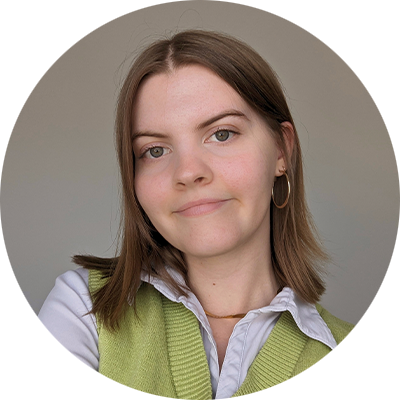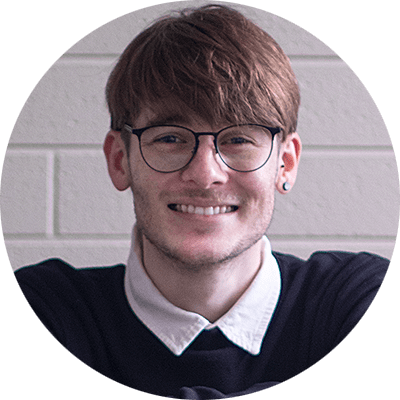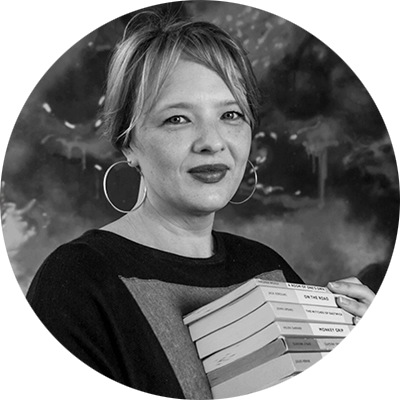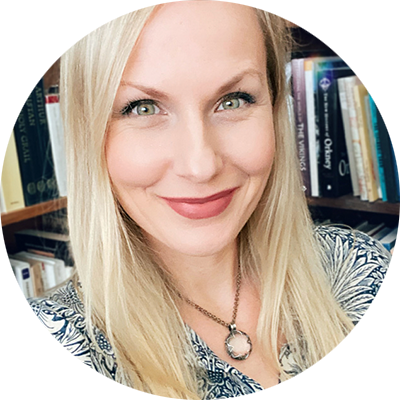Entry requirements
Key information
overall
overall
Note: Part-time equivalent study options are not available for international students.
Write your own future.
Prepare to work as an author, editor, researcher, writer or publisher with this specialised creative writing degree. You'll dive into genre fiction, learning from award-winning authors and industry leaders. Our creative writing educators are genre specialists across sci-fi, fantasy, romance and more.
Throughout this degree, you'll gain real-world experience to help you secure employment in the industry in both new and traditional fields. In your final year of study, you'll have the opportunity to work on a real-world project and publish your own work. With small class-sizes and hands-on learning, you'll join a community of like-minded creatives who will become your support network from day one.
Explore a wide range of genres and forms
Engage with diverse storytelling styles by studying genres such as romance, sci-fi, fantasy and literary fiction. Learn across formats including novels, series and short stories to develop a well-rounded writing portfolio.
Connect with industry experts from day one
Benefit from direct access to global industry professionals through guest lectures, workshops, networking events and placement opportunities. Students have collaborated with award-winning authors, literary agents, publishers, screenwriters and editors.
Learn from award-winning, internationally bestselling writers
Receive mentorship from active professional writers with extensive experience in the publishing industry. Participate in real-world projects to gain practical skills for careers in writing, editing and publishing.
Ranked in the top 2%
of the universities in the world
The World University Rankings 2024 as a percentage of the total number of universities in the world according to the International Association of Universities
No.1 in SA
in Communications for learning resources, overall educational experience and teaching quality
The Good Universities Guide 2025 (undergraduate), public SA-founded universities only
Australia's No.1
for Creative School
The Rookies Awards 2024
Turn words into global careers
Flinders graduates include award-winning authors, actors, animators, directors, cinematographers, editors, producers and writers. Your diverse range of skills and portfolio of creative achievements will make you attractive to a wide range of employers in the arts and communication industries internationally.
Salary
$113K
typical salary in Australia
Author
An author is a writer who creates original works such as novels, nonfiction books, or articles. They develop ideas, conduct research, and craft narratives or arguments to engage, inform or entertain readers. Authors may work independently or with agents and publishers to bring their work to market. Creativity, persistence and strong writing skills are essential.
Freelance writer
A freelance writer creates written content for various clients on a project-by-project basis. They may write articles, blog posts, marketing copy, or technical documents. Working independently, they manage their own schedules, pitch ideas, and deliver polished work tailored to different audiences and industries, often juggling multiple assignments at once.
Jobs growth
7.1%
5-year projection
Salary
$76K
typical salary in Australia
Sources: Seek Australia, 2025 | Talent.com, 2025
Copywriter
A copywriter produces persuasive and engaging written content for marketing and advertising. This includes website copy, product descriptions, emails and advertisements. Their goal is to drive customer action, such as purchasing or signing up. Copywriters must understand the target audience, brand voice and key marketing principles.
Editor
An editor reviews and refines written content for clarity, grammar, style and accuracy. They collaborate with writers to improve structure, coherence and tone. Editors may specialise in developmental editing, copyediting or proofreading. They work across publishing, journalism and corporate communications to ensure high-quality content.
Digital content producer
A digital content producer creates and manages multimedia content for websites, social media and digital platforms. This includes articles, videos, graphics and interactive features. They collaborate with writers, designers and marketers to ensure content aligns with brand goals and engages audiences. Tech-savvy and creative, they balance storytelling with digital strategy.
What will you study to start your career in creative writing?
In your first year, you'll study core topics. After your first year, you can focus on an area that interests you by choosing 2 option or minor topics in addition to your core topics. You'll also get hands-on experience with professional placements.
- Year 1
- Year 2
- Year 3
GENERAL
In your first year, you'll study core topics.
Year 1 - Core topics
Your first year will include the following topics. For exact topic information, visit the course Handbook.
- Ideas
- Story
- Publishing
- Storytelling
- Reading
- Creative Arts
- Communication
- Indigenous Studies
GENERAL
GENERAL
In your second year, you'll study core topics and your choice of two option or minor topics. You'll also get hands-on experience with placement opportunities and build industry connections.
Year 2 - Core topics
Your second year might include the following topics. For exact topic information, visit the course Handbook.
GENERAL
In your third year, you'll study core topics and your choice of two option or minor topics. You'll also get hands-on experience with placement opportunities and undertake an industry project.
Year 3 - Core topics
Your third year might include the following topics. For exact topic information, visit the course Handbook.
Customise your degree.
After your first year, you can focus on an area that interests you by choosing minors. This will help you work toward the career of your dreams.
MINOR
Writing for Stage and Screen
Writing for Stage and Screen explores theatre, film, and other texts to develop both critical and creative skills. This minor helps you adapt stories, create original characters and settings, and understand how conflict and structure shape engaging scripts. You’ll refine your storytelling instincts, learn key narrative theories and dramaturgical techniques, and gain practical experience in planning, pitching, and producing work for stage and screen through essential documentation and creative development.
Year 2 - Core topics
Contemporary Drama
*Topics may be subject to change.
Option topic
Your choice of any topic (4.5 units) university-wide, given entry requirements are met or a bachelor of creative writing minor
Year 3 - Core topics
Writing for Performance – Dramaturgy and New Writing
*Topics may be subject to change.
MINOR
Performance
The Performance minor is a hands-on introduction to acting, writing for theatre, and leading collaborative arts projects. You'll build skills in script analysis, character research, adaptations, collaboration and community engagement. Through practical workshops and original performance-making, this minor prepares you to create your own work and understand how text, performance and audience all come together in the world of theatre.
Year 2 - Core topics
The Actor and the Text - Adaptation and Audiences
*Topics may be subject to change.
Year 3 - Core topics
Community-Engaged Arts Practice
*Topics may be subject to change.
Option topic
Your choice of any topic (4.5 units) university-wide, given entry requirements are met or a bachelor of creative writing minor
MINOR
Drama
The Drama minor explores the relationship between text, performance and audience over time. You will analyse how theatre reflects society, politics and culture, and how performance texts shape staging. You'll examine the rise of the director in modern theatre and how contemporary Australian performance embraces identity and authenticity. This minor introduces you to trending themes in modern Australian theatre, empowering you to imagine your own role in this dynamic industry.
Year 2 - Core topics
Theatre in Context - Modern Theatre
*Topics may be subject to change.
Year 3 - Core topics
Contemporary Australian Repertoire
*Topics may be subject to change.
Option topic
Your choice of any topic (4.5 units) university-wide, given entry requirements are met or a bachelor of creative writing minor
MINOR
Screen Production
The Screen Production minor focuses on practical filmmaking and develops your fundamental skills in film and television production. You will study directing, producing, cinematography, sound and editing. In the final topic you will work in collaboration to produce a TV pilot from idea to broadcast. This minor is taught by passionate teachers and filmmakers who are actively involved in the industry.
Year 2 - Core topics
Screen Production Techniques - Short Documentaries
*Topics may be subject to change.
Year 3 - Core topics
Short Films
*Topics may be subject to change.
Option topic
Your choice of any topic (4.5 units) university-wide, given entry requirements are met or a bachelor of creative writing minor
MINOR
Screen Studies
Immerse yourself in the study of film, television, and screen media. Learn about the aesthetic dimensions of film style, explore film and television industries, and consider their social and ideological functions. You will encounter major filmmakers, film movements and genres. Develop strong analytical skills and enhance your knowledge of film history and theory.
Year 2 - Core topics
Film analysis - Documentary media
*Topics may be subject to change.
Year 3 - Core topics
History of Film Style
*Topics may be subject to change.
Option topic
Your choice of any topic (4.5 units) university-wide, given entry requirements are met or a bachelor of creative writing minor
Boost your knowledge with an Honours in Creative Arts.
By pursuing further study in creative writing, you’ll truly put theory into practice by developing a major creative work. Plus, you’ll develop strong research skills by developing a research question related to your creative product.
Ranked #1 in SA
in Creative Arts for full-time employment, student support and teaching quality.
The Good Universities Guide 2024 (undergraduate), public SA-founded universities only
Discover South Australia.
Where world-class education meets laid-back coastal living. With pristine beaches, acclaimed wineries, and vibrant festivals at your doorstep, South Australia offers an unmatched student experience.
Photo credit: SATC
Get inspired.
Discover more about Flinders University’s Bachelor of Creative Writing.
The Bachelor of Creative Writing
Learn about the course with Dr Amy Matthews.
Every day is different in a creative career
Get a taste of our Creative Arts courses. With world-class facilities and teachers who are industry experts, Flinders University is a true leader.
“I was able to develop my own anthology and come out of university as a published author.”

Abby Guy
Bachelor of Creative Writing
“I could explore so many varieties of fiction: science fiction, autobiographical writing, romance, fantasy just to name a few.”

Harrison Stewart
Bachelor of Creative Writing
Need support?
International Student Services (ISS) is the first point of contact for international student support. The university also offers everything from cultural, health, and wellbeing services, to academic support.
Campus tours
Take a virtual tour of our campuses, guided by your fellow international students.
FUSA
Flinders University Student Association (FUSA) is the heart of the Flinders Experience. FUSA is where you'll find out about events, club memberships, and extracurricular activities.
Accommodation.
Adelaide has many accommodation options for international students. You can choose to live on campus, at our city accommodation provider The Switch, or in rental accommodation.
Flinders offers a vibrant, fun, supportive uni experience you’ll remember for a lifetime.
Need support?
From cultural, health and wellbeing services, to study and financial support, enrolment advice and more, we’re here to help.
Student clubs
Flinders University Student Association (FUSA) is the heart of the Flinders Experience. FUSA is where you’ll find out about events, club memberships and extracurricular activities.
Campus facilities
Flinders’ campuses are hubs of activity, with retail and food outlets, library spaces, study and chill spaces and more.
Learn from the experts.
Our incredible teaching and professional staff are experts in their fields and well-connected to the industry.

Associate Professor
Dr Amy Matthews
An award-winning novelist, Dr Amy Matthews is the Chair of Writers SA and a Senior Lecturer in Creative Writing at Flinders University. Amy’s academic and teaching skills have also been recognised in multiple honours and awards. As Tess LeSue, Amy’s romance fiction novels have seen her stamp her mark on an industry worth over $1 billion.

Senior Lecturer
Dr Sean Williams
Dr Sean Williams is one of Australia’s most-awarded speculative fiction writers. With over 40 novels and 120 short stories for adults, young adults and children, the #1 New York Times-bestselling author certainly ‘walks the walk’ as a Lecturer in Creative Writing at Flinders.

Associate Professor
Dr Lisa Bennett
Lisa Bennett is a specialist in Old-Norse Icelandic literature, the Viking Age, genre fiction, and creative practice. Under her pen name, Lisa L. Hannett, she is an internationally recognised, multiple award-winning writer of 5 short story collections, a novel, and over 80 speculative fiction short stories (fantasy, science fiction, horror, and historical fiction).

Lecturer
Dr Alex Cothren
Alex Cothren’s multi-award-winning short stories address social issues through the lens of satire, parody and comedy-horror. Featuring haunted pokies machines, political bee cults and chainsaw-wielding bears, his weird works have graced (or marred) the pages of our country’s best publications, such as The Griffith Review, Meanjin, Overland, and Island. In 2023, he was named a Griffith Review Emerging Voice.
How to apply.
We know not everyone begins uni the same way, so we offer a variety of pathways into Flinders.
Use the dropdown to tell us a bit about you.
Alternative pathways
UniTEST
If you’re in Year 12, taking the free uniTEST can help boost your chances of getting into Flinders.
Research Project B Pathway
Strong results in your Research Project B subject along with your Year 12 results can be considered for entry.
Year 12 Grades Entry
By using three of your best Year 12 grades, you can also gain a place in your course of choice.
School Recommendation Program
Your school’s recommendation about your academic performance may be considered as part of your admission.
If you started uni but didn't finish, you may be able to gain entry into Flinders with a higher education transfer.
Higher education transfer
If you’re studying at another university, you may be able to transfer to Flinders based on your Yr 12 results, current GPA or other factors.
If you've had TAFE or VET training, you may be able to continue your study with Flinders.
TAFElink
Even if you didn’t finish high school (Year 12), you may be able to study at Flinders through your TAFE/VET qualification.
Dual offer pathways
You may be able to complete a TAFE SA course and have guaranteed entry into Flinders.
Credit transfer
The TAFE/VET stud you’ve already done may be able to be used as credit towards a Flinders’ course.
No ATAR? No worries. If you've got work or life experience, there are pathways into Flinders.
Flinders Foundation Studies
The Foundation Studies Program is free and guarantees entry to a range of degrees.
Skills for Tertiary Admissions Test (STAT)
The STAT is a 2-hour multiple choice test that assesses your abilities.
Year 12 qualifications
If you completed Year 12 more than two years ago you can still use your results to apply.
Concerned about your ATAR? If it doesn't meet the course requirement, or if you don't receive one, we offer alternative pathways to admission. Contact us to discuss your options—we're here to help.
- Entry requirements
- Application options
If you don’t meet our English language entry requirements and need to improve your English language proficiency, you can do so through Flinders University Academy – or our approved English Language Instruction Course for Overseas Students (ELICOS) providers.
This means that you can attend the required English language tuition at approved ELICOS providers and gain direct entry into university without an IELTS or TOEFL test.
If you don’t meet our academic entry requirements, you can still gain entry to Flinders University through Flinders University Academy. With a range of diplomas, foundation and English language courses, students can find a direct pathway into the destination degree of their choice.
How to apply
Select your course.
Check entry requirements.
Check your eligibility for credit.
Obtain certified documents.
Submit your application and documents.
Application options.
Apply online
Follow up our step-by-step guide to help you with your application to study at Flinders.
Find an agent
Our registered education agents around the world understand the university system and will guide you through the application process.
Contact us
Get in touch with our team to discuss your preferences, career options, pathways, and course and entry requirements. We are here to ensure you have everything you need to choose the right degree for you.
Don't meet academic requirements? Don't worry. We'll help you get there.
Preparatory courses
If you lack required English proficiency, improve through Flinders University Academy or approved ELICOS providers for direct university entry without IELTS/TOEFL tests.
Flinders University Academy
If you do not meet entry requirements for your desired degree, Flinders University Academy will provide you with a direct pathway into the destination degree of your choice.
Frequently asked questions.
Over the years, many questions have been asked by students before. For the quickest answers view our frequently asked questions or browse the full list @ Ask Flinders.
Creative writing is a type of writing that goes beyond facts and information. It's about using imagination, voice, and emotion to tell stories or express ideas. This can include fiction, poetry, screenwriting, and creative nonfiction. As a student, you’ll explore how to develop characters, build tension, use language effectively, and find your own unique style. It’s both an art and a skill that improves with practice and study.
Becoming a writer starts with writing consistently and thoughtfully. As a student, studying writing gives you structured opportunities to learn the craft, get feedback from peers and instructors, and read widely to understand different genres. Join writing groups, attend workshops, and take advantage of mentorships or internships. A degree isn’t required to be a writer, but education can give you the tools, discipline, and network to grow your voice and career.
Writer earnings per book can vary widely. Traditionally published authors might earn an advance (anywhere from a few thousand to six figures) and royalties (typically 5–15% of sales). Self-published authors earn more per sale but bear the publishing costs themselves. Some books earn little, while bestsellers can bring in substantial income. Ultimately, it depends on factors like genre, publisher, marketing, audience size, and sales volume.
- Applications are completed via SATAC
- Visit: satac.edu.au
The table below shows ATAR and Selection Rank data for students offered a place wholly or partly on the basis of ATAR commencing in Semester 1, 2025. It is limited to applicants that have recently completed secondary education (within the last two years). Data may reflect multiple courses available within a suite of courses.
Notes:
<5 – less than 5 ATAR based offers made
N/A – This course uses additional selection criteria and therefore Selection Rank is not published
| ATAR-based offers only across all offer rounds | ATAR - Excluding adjustment factors | Selection Rank - ATAR plus any adjustment factors |
|---|---|---|
| Highest rank to receive an offer | 95.20 | 99.95 |
| Median rank to receive an offer | 76.17 | 80.42 |
| Lowest rank to receive an offer | 57.75 | 61.00 |
The table below gives an indication of the likely peer cohort for new students in this course. It provides data on students who commenced study in this course in Semester 1, 2025 including those admitted through all offer rounds and international students studying in Australia. Applicant background groupings are based on educational background, not basis of admission. Data may reflect multiple courses available within a suite of courses.
Notes:
<5 – the number of students is less than 5
N/P – Not published: the number is hidden to prevent calculation of numbers in cells with less than 5 students
| Applicant background (Semester 1, 2025) | Number of students | Percentage of all students |
|---|---|---|
| Higher education study (includes a bridging or enabling course) | 44 | 37% |
| Vocational education and training (VET) study | 5 | 4% |
| Work and life experience | <5 | <5 |
| Recent secondary education - Admitted solely on the basis of ATAR (regardless of whether this includes the consideration of adjustment factors such as equity or subject bonus points) | 28 | 24% |
| Recent secondary education - Admitted where both ATAR and additional criteria were considered (e.g. portfolio, audition, extra test) | <5 | <5 |
| Recent secondary education - Admitted on the basis of other criteria only and ATAR was not a factor (e.g. special consideration pathways) | 17 | 14% |
| International Students | 18 | 15% |
| All students | 118 | 100% |
Frequently asked questions.
Get in touch with us to discuss your preferences, career options, pathways and course and entry requirements. We are here to ensure you have everything you need to choose the right degree for you.
The type of documents you will need for your international application depends on what course you are applying for and which country you are a citizen of. Course requirements are stated on each course webpage. Examples of documentation you might expect to provide for your international application include a copy of personal identification, academic transcripts or a resume.
Once you have received your Confirmation of Enrolment (CoE) letter from Flinders University, you should apply for your visa as soon as possible as visa processing times can vary. You will receive your CoE letter after you have applied to study at Flinders, accepted your offer and paid the semester tuition fee.
No. Part-time study is currently not available for international students due to visa conditions.
No. Online study is currently not available for international students due to visa conditions.
If you don’t meet our English language or academic entry requirements, you can still gain entry to Flinders University through our on-campus pathway provider Flinders University Academy. Alternatively, you can improve your English language proficiency through our approved English Language Instruction Course for Overseas Students (ELICOS) providers.
You can apply to study as an international student directly through Flinders University or an authorised agent in your country.
If you are from one of the countries listed, you are required to apply via an education agent. If you reside onshore in Australia, you will not require an agent even if you are from the countries listed above.
Yes. As a student visa (subclass 500) holder, you and your dependents (family members) can work up to 48 hours a fortnight when your course of study is in session. If you have started a master degree by research or doctoral degree, this rule does not apply to you and working hours are not restricted.
Our dedicated International Student Services (ISS) team provide a range of programs supporting your enrolment, study and social life, as well as a referral service to facilities on campus and within the local community.
![]()
Sturt Rd, Bedford Park
South Australia 5042
South Australia | Northern Territory
Global | Online
CRICOS Provider: 00114A TEQSA Provider ID: PRV12097 TEQSA category: Australian University








